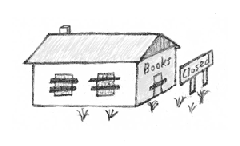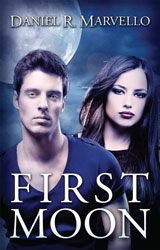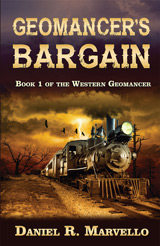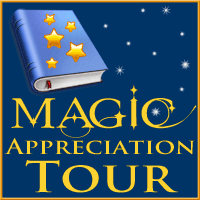I plan to self-publish my first fiction book.
By the time I get a traditional publishing contract (assuming I ever would) and finish my book, all of the advantages of going with a traditional publisher will be gone. In many respects, those advantages are already gone, which is why even some successful traditionally-published authors have switched to self-publishing (Seth Godin and Joe Konrath come immediately to mind).
I’ve seen the advantages and disadvantages of going with a traditional publisher versus self-publishing debated all over the Web by people a lot smarter than I am, but I have to decide for myself what makes sense for me personally. So here you have my completely biased views on the subject.
To understand how things have changed in the favor of self-publishing, you have to first consider the supposed advantages of going with a traditional publisher:
- Industry vetting of your writing
- Professional editing, layout, and cover design
- A cash advance and royalties
- Wide distribution to book stores
- Promotion
Let’s look at the reality of those advantages.
Industry Vetting
Many writers believe that being accepted by an agent and then by a publisher means your writing is good, and being rejected means it’s bad.
Hogwash.
Publishers reject manuscripts for many reasons, and not liking your story is just one possibility. Publishers are trying to survive in a shrinking market with dwindling resources, so they have to place their bets on books they believe have a chance to be blockbusters. If your book appeals to too narrow of a market segment or to a segment that doesn’t interest them, publishers will reject it in favor of something that is more in line with whatever is selling hot for them right now. I saw one author complain that landing a deal for a Young Adult fiction book is almost impossible unless you have vampires and werewolves in your story (largely thanks to Stephanie Meyer).
As you may know, Harry Potter was rejected a dozen times before a publisher picked it up, and the Chicken Soup for the Soul series was rejected over 100 times. The Chicken Soup authors finally got a publishing deal after they successfully self-published their work!
The quality of the work clearly has little to do with what interests traditional publishers: they want exceptional sales, or it isn’t worth their time.
Professional Production Quality
I will be one of the first people to agree that the biggest mistake many self-published authors make is that they produce a poor quality product. With authors like Amanda Hocking earning nearly a half-million dollars in one month or Joe Konrath making a “mere” $20,000 a month, other authors think they can rush a book out to market and start raking it in. It’s classic “get rich quick” thinking, where you try to get something for nothing. These people give self publishing a bad name.
Meanwhile, a traditional publishing company has an entire organization dedicated to producing a high-quality book with a great cover, careful editing, and an appealing layout.
Okay, fine. I’ll concede that point.
But guess where many of those professional editors, cover designers, and layout people come from? Some are third-party companies who specialize in those production skills, and others are freelancers.
You can hire them too!
The truth is that successful self-published authors like Joe Konrath and Amanda Hocking take the production quality of their books very seriously. If you want to publish your own work, getting professional help with the editing and packaging of the book is part of the cost of doing business.
Cash Advance and Royalties
Some authors have dreams of getting a big advance on their book that will set them free to write full time, so they can write their next book and earn another big advance. In the meantime, royalty payments help them keep the lights on.
Sorry, Charlie.
The truth is that only established authors get big advances these days. As an unknown, you’ll be lucky to get five thousand dollars. How long can you live on that?
And royalties? Forget it! Remember, an advance is actually an “advance on royalties,” which means your book first has to sell enough copies for the royalty payments to catch up to the amount of your advance. Most books never “earn out” their advance, so the odds of you ever seeing a royalty check are minimal.
Finally, even if you do write the next Twilight, earn out your advance, and start getting royalty checks, you’ll be making a fraction of what you could earn from the same sales if you published the book yourself.
Wide Distribution to Book Stores
A traditional publisher has the resources to print thousands of copies of your book and the distribution deals to get your books into book stores across the country, where your readers snap them up hungrily.
Works great in theory. But this is one of those times when theory and practice aren’t quite the same.
Yes, thousands of your books will be printed and distributed across the country. Yes, you’ll be able to walk into your local book store and take a copy of your book off the shelf and hold it lovingly to your chest.
But if you are like the majority of new authors, your books will be on the shelves for about six weeks before they are punted for the next potential blockbuster. The books that don’t sell are remaindered, which means the next time you see them for sale, it will be for a dollar at the local warehouse book store.
And it gets worse. Borders just declared bankruptcy and is closing 200 stores. The largest book distributor in Canada H.B. Fenn also initiated bankruptcy proceedings. Independent books stores are closing all over the country. Book stores are dying. Distribution to book stores won’t be much of an advantage at all by the time your book wades it’s way through the 18-month-plus production cycle of most publishers. And that’s if you already have a deal today.
Promotion
What promotion? I almost include this “advantage” as a joke, except that most authors actually believe their publisher will help them sell their book.
Nope. Not happening.
Your publisher can’t afford to publicize every first-time author who comes through the door. They spend that money on the authors and books that have already proven their chops.
However, you may be expected to travel around and do book signings, which are largely a huge waste of your time and your money. Want a web site for your book that is more than some auto-generated template-based thing sitting on a publisher’s web site alongside thousands of their other titles? You need to set it up yourself. On your dime.
The truth is that you will be responsible for virtually all promotion related to your book. If you are going to go to all that work anyway, why not reap all of the rewards?
Interestingly, these days promoting a book is mostly about getting the ball rolling. The Internet is a fabulous, inter-connected, and social beast. If you can get enough people excited about your book, promotion becomes a viral thing that spreads on its own. For example, improving your sales rank on Amazon gets your book better placement in search results and their cross-selling features, which increases your sales, which improves your rank, and so on.
So there you have it. My totally biased view on just some of the reasons why self-publishing is better than going with a traditional publisher. But guess what? These aren’t just my views. I didn’t just make this stuff up. Check around, and you’ll find plenty of other authors who learned it first-hand, the hard way. I thank them for blazing the trail and experiencing the pain of tangling with the thorns of traditional publishing for me.
Wait, did I just write “some of the reasons” a moment ago? Yes. I haven’t even started on the disadvantages of traditional publishing. That will have to wait for another time.










